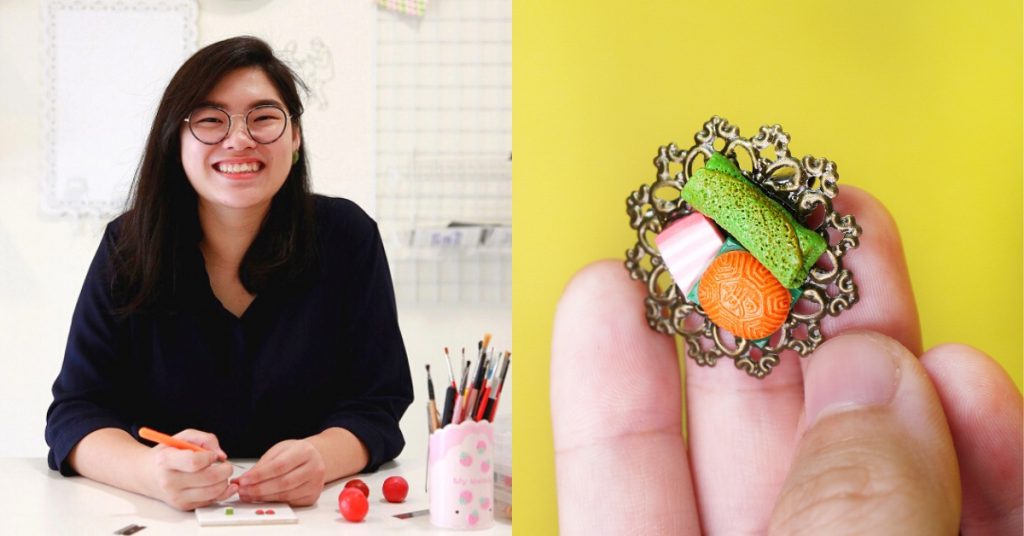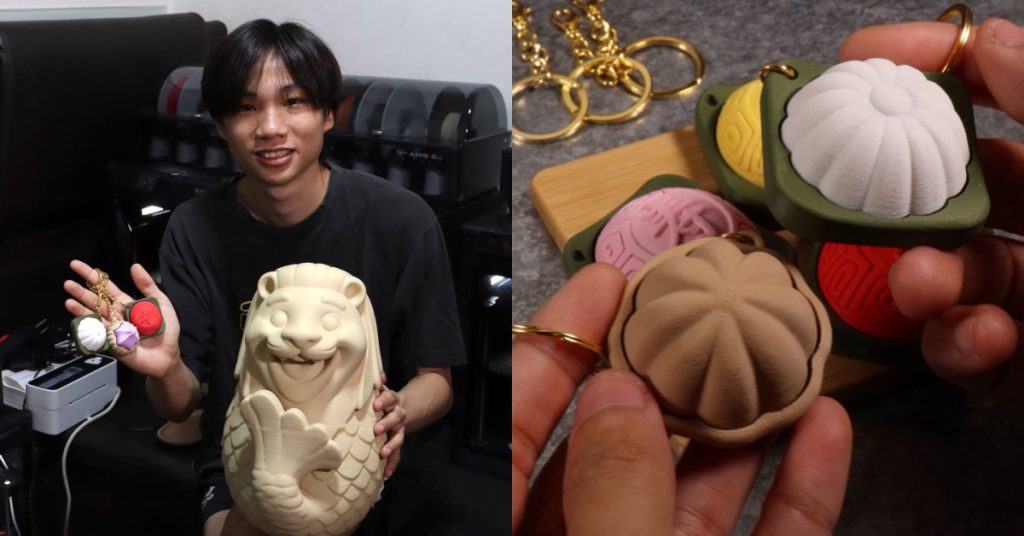Author’s Blurb: I’ve always been in awe of passion-to-profit stories, and perhaps slightly envious as to how people make a living just simply doing what they’re passionate about. But I’ve also always wondered if a hobby turned full-time job still maintains it’s magic, and what hard lessons need to be learnt about the whole ‘do what you love’ shtick.
Ask any art geek what’s their favourite form of DIY crafts and you’d probably get an array of answers ranging from scrapbooking to repurposing home furniture.
Ask this Malaysian however, and she’d tell you that she went for a tinier form of expression.
Ling Hooi Yin is the face behind TinyPinc Miniatures—a hobby that she started out spending only a couple of hours per day on, which then turned into her full-time job.
A Unique Arts & Craft Project
In 2010, it was love at first sight for Ling when she discovered the one craft that would change her life.
It was none other than the art of moulding polymer clay. “At first the medium caught my attention. It’s so versatile, and you can turn it into almost anything,” said Ling.
“All of this started out as a hobby. Then, my friend ordered something for her and her boyfriend. She was my first customer!” Ling exclaimed.
She slowly began experimenting with more Malaysian delicacies like char kuay teow, wantan mee, siew yoke, durian, and more.

When McDonald’s released their Nasi Lemak Burger in 2018, one of Ling’s pieces for the brand was featured in their YouTube ad ‘Nasi Lemak Burger – #GengNasiLemak‘ (check out the 0:11 timestamp).
Fast forward to 6 years later, and her products have been sold to fans from France, Russia, Hong Kong, and 5 other countries. She’s also collaborated with multinational companies such as Milo, AirAsia, and Malaysia Airlines.
But even though Ling loves what she does, she told Vulcan Post that it’s not always a walk in the park.
Here are 5 hard lessons she’s had to learn over the years, and how she managed to become one of the most notable names in the Malaysian miniatures scene.
1. Don’t be afraid to put a price on hard work.
On average, a TinyPinc charm would range anywhere from RM50 to RM200.
This may seem pricey at first, but Ling told Vulcan Post that it could take hours on end to make one single piece.
“Making something from scratch would usually take hours. I have to go through trial and error for the size, texture, shape and colours. I try to find ways to easier replicate miniatures, but there are some types of food that just have to take hours on end to make,” Ling said.
Yet she’s still generous enough to give Malaysians a bit of a discount on her products. All of TinyPinc’s products are priced slightly higher on her Etsy shop (which handles only international customers) compared to her website.

2. Growing a business might lead to growing pains.
“My hands would hurt due to pinched nerves. I was told by my therapist that it was bound to happen anyway, so there’s nothing I can do to avoid that,” Ling commented on how her work has affected her health.
She said that sitting down for long hours led to her developing back, neck and wrist problems too.
It also didn’t help that when she was just starting out, she worked on the business from her bedroom. This led to an unhealthy work-life balance and took a toll on her mental health.
However, once she rented an art studio of her own where she could clock into and out of work, her situation improved.

Ling also made sure to emphasise on setting boundaries for herself. “The hours invested may be long, but it’s crucial to set working hours in a day.”
3. When met with ignorance, focus on raising awareness.
Despite the name she’s made for herself, not everyone who Ling encounters can appreciate the effort that goes into her craft.
“People thought that they were easy to make because they’re made out of clay. The occasional passerby at my pop-up booths would say that it’s easy to make and that even their kids could do so,” said Ling.
This proved to be more frustrating when she encountered customers that tried to haggle for discounts.
So Ling adopted a different approach. On a regular basis, she tries to educate her followers about her creative process by illustrating the methods of making miniatures on social media.
She also holds art workshops for fans to get involved with the behind-the-scenes of creating their own miniatures.

4. It’s important to diversify streams of income.
“The best part (of what I do) is obviously the satisfaction of making miniature things, and getting all the support from random strangers on social media,” she said.
But Ling also admitted that the worst part is her constant worry about the stability of her job.
“I’ve had thoughts like ‘what if I can’t use my hands anymore?’, or if there’s a really bad economic crisis, ‘what will TinyPinc become?'”
Art markets used to be special events for Ling as well, but as rental prices went up for booths, she slowly stopped attending them.
To ensure sustainability, Ling had to diversify her streams of revenue—and she had to do it fast.
So she made herself an account on Patreon, a platform for artists to get funding from their followers via a one-time donation or a monthly subscription.
“Those who subscribe to my Patreon would get to receive something new every month, at a cheaper price,” Ling added.
5. With all bootstrapped businesses, it’s good to ‘tahan‘, but necessary to have a back-up plan.
“Love what you’re doing. If you’re in it for the money, I’m so sorry to tell you, you won’t get rich doing what I do.”

That’s what Ling told us when asked about what words of advice she’s comfortable giving artists who are considering something similar.
“Always have a back-up plan. If this job fails, you still have an office job to go back to. Always have at least 6 months of salary worth in your bank account,” she explained.
Bottom Line: Turning a hobby into a full-time job definitely sounds awesome on paper. Regardless, it can still be riddled with a great level of uncertainty and struggle—especially if you’re running it alone. It might not be the ‘dream job’ it’s made out to be, but if you have the same fighting spirit as Ling, I’d say it’s worth it at the end of the day.
- You can read more about other Malaysian startups here.
Featured Image Credit: TinyPinc












